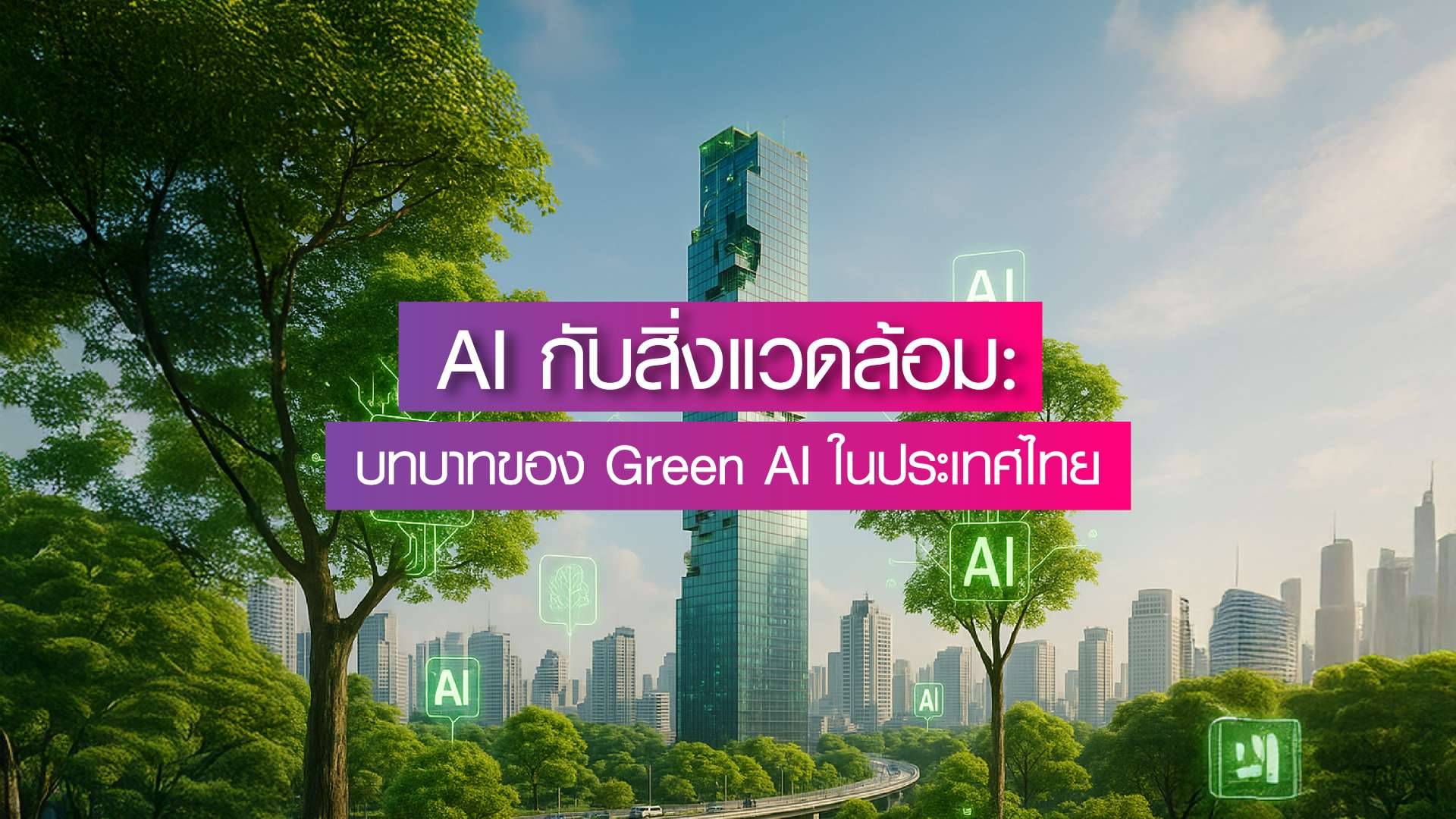
AI and the Environment: Green AI in Thailand
ARTICLES | May 20, 2025
Thailand is entering an era of rapid AI growth, particularly in areas such as IoT, Generative AI, and Machine Learning, which are being applied across various sectors including industry, logistics, healthcare, agriculture, and education. 62% of Thais are now using Generative AI to boost efficiency, reduce costs, and spark innovation.
But this rapid growth comes with negative consequences, including the risk of job displacement in repetitive roles, a shortage of new skillsets, ethical concerns, and most importantly, environmental impacts from the massive energy consumption required to train large AI models and the increase in electronic waste (e-waste).
As a result, the concept of “Green AI”—the sustainable development and use of AI—has gained traction in Thailand. It focuses on 2 main aspects:
• Green in AI: Minimizing the environmental impact of AI development, such as through energy-efficient computing
• Green by AI: Using AI as a tool to solve environmental issues, such as energy management and waste reduction
Driving Green AI in Thailand
1. Policy and Academic Platforms:
Thailand is playing a leading role on the global AI stage by hosting the UNESCO Global Forum on the Ethics of AI in 2025, including a competition titled “Beyond Green AI for a Thriving Future”, which invites students to propose sustainable AI ideas. The forum also includes academic exchanges on AI ethics, governance, and sustainability, jointly driven by ETDA, CMKL University, and UNESCO, highlighting Thailand’s commitment to promoting Green AI alongside ethical principles.
2. Research and Technology Development:
Thai academic and research institutions are focusing on developing energy-efficient AI, such as through model compression techniques (e.g., using 1-bit models instead of 16-bit), custom low-energy hardware, and open-source Green AI models. At NAC2025, energy-saving AI strategies were presented, including cloud migration (reducing carbon by 25–50%) and increased use of renewable energy in data centers, reflecting a shift toward AI sustainability across the entire lifecycle.
3. Supportive Policy and Infrastructure:
The Thai government has begun laying the foundation for Green AI through the promotion of green digital infrastructure like Green Data Centers. Over 47 cloud and data center projects worth nearly 200 billion baht have applied for BOI investment incentives. Major tech companies like Amazon, Microsoft, and Google have announced investments in Thailand with a strong focus on clean energy. The government’s PDP2024 energy plan targets 51% renewable energy by 2037, aligning digital economic growth with long-term sustainability.
4. Global Pressures and Future Direction:
Worldwide, environmental regulations on AI are intensifying. For example, the EU is preparing legislation requiring developers to disclose the energy usage of their AI models, and Singapore has already implemented Green Data Center policies in line with carbon reduction goals. This global trend is likely to spread to other nations, including Thailand, which has committed to Carbon Neutrality and Net Zero GHG targets. As part of the global AI value chain, Thailand must adapt by balancing cost, environmental protection, and energy security.
Examples of Green AI in Thailand
1. SCG Chemicals (SCGC):
Developed the “AI Supervisory” system to optimize energy use in petrochemical plants. This reduced electricity costs by 17 million baht per year without requiring machinery upgrades and cut greenhouse gas emissions by 1,600 tons per year—equivalent to planting 160,000 trees.
2. WHA Group:
Uses AI to manage solar energy systems, monitor solar panel efficiency, and maintain system stability. The company also developed the “Green Logistics” platform, which uses AI to plan electric vehicle (EV) delivery routes, reducing logistics costs and emissions.
3. Electricity Generating Authority of Thailand (EGAT):
Utilizes AI to forecast renewable energy output, predict equipment failures in power plants and dams, and has developed “Grid Modernization” using AI to stabilize power distribution and enable the safe integration of a high share of renewable energy.
The concept of Green AI is gaining increasing attention in Thailand. Many organizations now recognize that AI is not just a tool for improving efficiency but also a key driver of ESG (Environmental, Social, Governance) goals. When applied appropriately, AI can fuel innovation and long-term sustainability.
Successful cases from Thai companies like WHA and SCGC demonstrate that AI can be a valuable investment, not only for economic growth but also for environmental and social impact. Ultimately, integrating AI with eco-conscious thinking will help Thailand progress toward a smart and green future, built on technological advancement and environmental balance.
Sources: Nation Thailand, Bangkok Biz News, Krungsri Research, ศูนย์วิจัยกสิกรไทย, สวทช., UNESCO, SCG Chemicals, WHA Group และการไฟฟ้าฝ่ายผลิตฯ










